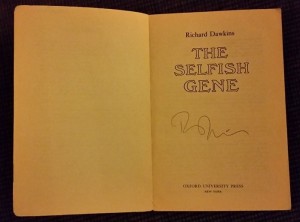Advancing the Atheist Movement: Dawkins, Dennett, and the Second Wave

Instead of fighting the old battle of atheism versus religion, the second wave will fight a battle against religious intolerance of atheism.
When I was in college, majoring in biology, my advisor gave me a copy of a recently published book called The Selfish Gene (1976) by some guy named Richard Dawkins. While I was unaware of the splash it had already created in the scientific world, it’s no exaggeration to say that I could actually feel my worldview shifting as I read it. The Selfish Gene reaffirmed not only my chosen career in biology, but my belief in material explanations for even the most complex questions. Reading it even caused me to seriously question the idea of free will. A few decades later I rediscovered Dawkins, this time in a different role as a leader of the new atheist movement.
Recently I had the opportunity to hear Dawkins speak in Boston with fellow professor and atheist spokesman Daniel Dennett. After a conversation about language, memes, and the influence of the Internet, Dawkins and Dennett opened the floor to questions. Unsurprisingly, most questions were about religion and the atheist movement. At one point, Dawkins commented that the atheist movement was following the same successful path in the United States as the gay rights movement.

The author’s original copy of The Selfish Gene, signed by Richard Dawkins (photo courtesy Geoffrey Hodge)
I disagree. A look back through history shows that successful social movements like women’s suffrage, black civil rights, and gay marriage progress through two waves. The first step is to unite and mobilize the marginalized group, encouraging individuals to be proud of their differences, to stand up for their rights and to speak out against discrimination. The new atheist movement has done this well, and Dawkins and Dennett deserve much credit for carrying the banner. But creating a strong and vocal base is not sufficient to bring about social change. It requires a second wave, different in character from the first. The second wave must convince moderate people outside the marginalized group that discrimination against the minority group is real, harmful, and intolerable.
When I got a chance to ask Professors Dawkins and Dennett about this observation, suggesting that in order to isolate intolerant fundamentalist Christian views, the new atheist movement in the US should consider more outreach to liberal Christians, their answers were interesting. Dennett acknowledged that a second wave was needed, but ultimately agreed with Dawkins’ reluctance to reach out to liberal Christians. Dawkins’ explanation was quite revealing. To paraphrase, he considers liberal Christians to be deluded atheists—people who cling to religion despite being unable to accept some of its most basic tenets. He went so far as to say that he prefers dealing with fundamentalists, because they at least are true to their beliefs. Both Dawkins and Dennett went on to describe a hope that gradually more atheists will become public figures in politics and Hollywood, eventually turning the tide.
To me, this view is somewhat naïve. The overwhelming success of the gay marriage campaign in the US has not been due to a sudden increase in the number of people identifying as gay; the movement has succeeded because more and more moderate heterosexuals are convinced that it’s unfair to limit access to marriage based on ancient discriminatory beliefs held by some religions. Nor has other social change occurred due to a sudden increase in the numbers of women or African Americans. Again, these movements succeed by appealing to moderate people outside the minority and by portraying the source of discrimination as an unreasonable minority of misogynists, bigots, and homophobes. The rise of the term “homophobe” as a pejorative illustrates just how effective this strategy was. This was also the brilliance of Martin Luther King Jr.’s temperance, which created the stark contrast necessary to isolate the bigots and display them as unreasonable and undesirable elements of society.
Perhaps the views of Dawkins and Dennett should not have been surprising, but I hope they aren’t universal. They seem to be victims of what I call the scientist’s fallacy—the idea that truth is so powerful that facts alone will win the argument. If you’ve been paying any attention to US politics recently, you know that this is not the case. In fact, the politicization of scientific issues has led to some interesting research into the elements of persuasive arguments. It should come as no surprise that insulting someone’s beliefs is not an effective way to change their viewpoint. What is surprising is that even facts are often ineffective and sometimes even detrimental to changing someone’s mind. To succeed, the atheist movement needs to win not just the minds of moderate believers, but their hearts as well.
Dawkins and Dennett do not want to ally with liberal Christians; they want to convert them to atheism. They believe that continued criticism of religion will swell the ranks of atheists to create an eventual majority. This is essentially a fundamentalist view of atheism, in which opposing views must be overcome: conquer religion first, then discrimination against atheists will be eliminated. But this may not be the right approach. Evolutionary biology and neurobiology suggest that we may be hardwired for religion. Liberal churches address a need for spirituality and community without the harmful fundamentalist insistence that the rest of the world must conform to their ideas. Instead of fighting the old battle of atheism versus religion, the second wave will fight a battle against religious intolerance of atheism. In this battle, the liberal churches are our allies. They are the people who will help elect the first openly atheist president over the objections of the fundamentalists. This is a battle that can be won long before religion disappears (if it ever does), and in winning this battle, the scientific worldview embraced by atheists will regain influence.
Atheist fundamentalists like Dawkins and Dennett will continue to play an important role in the social movement as outspoken critics of the harmful influence of religion on society, but their progress will be incremental. They have blazed a trail, but it is up to moderate atheists like me, and hopefully you, to bring about the second wave of social change.
Although I may not have been able to convince Dawkins to reconsider the strategy of the atheist movement, I did get one thing I was after that evening: he was kind enough to sign my thirty-five-year-old copy of The Selfish Gene.
